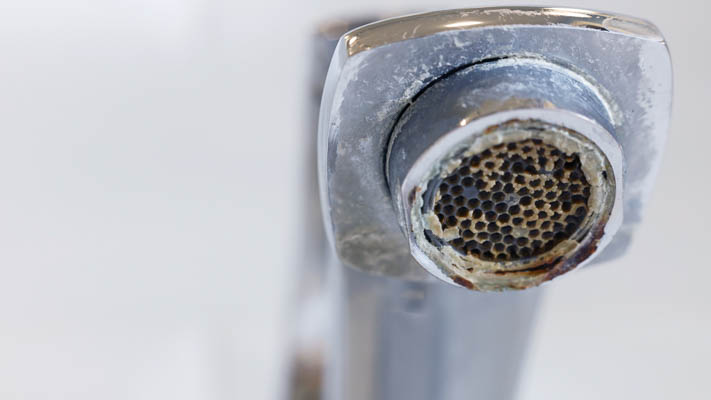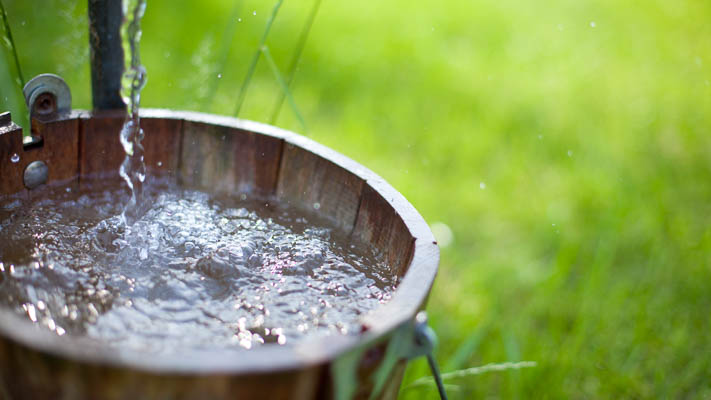Why Does My Well Water Pressure Keep Going Up and Down?
Pressure changes in a well system usually come down to a few key components: the well pump, the pressure switch, and the pressure tank. When one of these isn't functioning correctly, your water flow may rise and fall unexpectedly.
Some common reasons include:
- Pump problems: If the pump is short-cycling (switching on and off too often), it can't maintain steady pressure.
- Pressure switch issues: A faulty switch can misread the system's pressure, cutting the pump off too soon or running it longer than necessary.
- Pressure tank failure: When the tank loses its air charge, it can't regulate pressure properly.
Fluctuations in well water pressure can also happen when demand is too high for the system to keep up. For example, if multiple showers, a dishwasher, and laundry are running at the same time. If you notice this happening regularly, it may be a sign your plumbing system needs updating.
Can Clogged Pipes Cause Well Water Pressure Problems?
Clogged pipes are one of the most overlooked reasons for water pressure fluctuations. Over time, mineral deposits, sediment, or even rust can build up inside your pipes, restricting flow. This buildup is especially common in older homes with galvanized steel pipes, which are highly prone to corrosion.
Some clear examples include:
- Iron and mineral scale: In hard water areas, calcium and magnesium can coat the inside of pipes, gradually narrowing them until water flow slows to a trickle.
- Rust flakes from corroding pipes: As galvanized steel pipes break down, rust particles not only discolor your water but also create partial blockages that interrupt pressure.
- Sediment from the well itself: Sand or grit drawn up from the aquifer can settle in your plumbing over time – particularly in horizontal runs of pipe – choking water flow.
- Hot water issues: Mineral buildup is often worst inside hot water lines and heaters, which can make showers feel weaker than cold taps in the same bathroom.

If you notice uneven water pressure from one fixture to another (e.g., the upstairs shower dribbles while the kitchen sink is strong), it's often a localized clog. But if the whole house suffers from slow-filling sinks, weak hot water, and frequent pressure drops, that's usually a sign your piping system itself is deteriorating. In that case, repiping is often the only lasting solution.
How Do I Keep My Well Water Pressure Constant?
Keeping water pressure steady usually involves a mix of regular maintenance and the right system setup. Here are some practical steps:
- Inspect and service the pressure tank: Make sure the tank is holding the correct air charge. A failing tank is one of the most common causes of pressure swings.
- Check the pressure switch: Adjusting or replacing a worn-out switch can restore balance to your system.
- Install a constant pressure system: This equipment uses a variable-speed pump controller to maintain steady water pressure, even when demand changes.
- Schedule routine inspections: A professional can test flow rates, inspect pipes for buildup, and ensure the system is running efficiently.
Homeowners who rely heavily on their well system (especially in larger households) often benefit from upgrading to a constant pressure system combined with newer piping. This setup reduces wear and tear on the pump and helps prevent annoying pressure fluctuations.
Can Repiping Fix My Well Water Pressure Issues?
In many cases, yes: if your plumbing system is made up of outdated or corroded pipes, no amount of pump adjustment will fully fix pressure changes. Clogged or narrowing pipes simply can't deliver water at a steady rate, so they must be replaced.
Repiping replaces old materials with modern, durable options like PEX (cross-linked polyethylene) or copper:
- PEX piping: PEX is highly flexible, which allows it to be routed through walls and around corners with fewer fittings. Fewer joints mean fewer weak spots where clogs or leaks can form. It's also resistant to both chemical corrosion and mineral buildup, making it ideal for homes that rely on well water, which can vary in quality. We have an article about why we believe PEX is one of the best piping materials on the market today.
- Copper piping: Copper is one of the most time-tested plumbing materials. It not only lasts for decades but also has natural antimicrobial properties, which help maintain water quality as it travels through your pipes. Copper is also highly resistant to high water pressures, making it a strong choice for homes where pumps deliver water in surges.
By installing new pipes, you eliminate flow restrictions caused by mineral buildup and corrosion. Many homeowners notice an immediate improvement in both water pressure and water quality after a repipe. If you're unsure which material is best suited for your home, you can read our detailed breakdown on whether to repipe with PEX or copper.
At Repipe Specialists, we've completed over 75,000 repipes across the U.S. Our streamlined One-Stop Repipe™ Process means most homes are fully repiped in just a day, with wall patching handled shortly after. Repiping not only solves water pressure issues, it also protects your plumbing system for decades to come.
Get your free estimate today
With over 75,000 repipes completed, we've perfected our One-Stop Repipe™ for your home.
Get a Free Quote for a Full-Home Repipe Today
At Repipe Specialists, we've repiped thousands of homes since 1991, and one of the biggest improvements well homeowners see is steady and reliable water pressure. Aging or undersized pipes often cause weak showers, slow sinks, and fluctuating flow. By replacing them, you can restore consistent pressure and the overall performance of your home's fresh water plumbing. We consistently deliver results that exceed expectations, restoring not just water pressure but also overall plumbing performance.
- Speed: Our repipe crews typically complete a repipe in a day, returning on another day for wall patching.
- Convenience: Through our One-Stop Repipe™ Process, we handle everything from permits, to wall patching, to inspections.
- Cleanliness: Our crews are trained to protect your home while working (we cover all surfaces with protective sheeting), and to clean up fully at the end of each day.
- Peace of Mind: Repipe Specialists is a fully licensed plumber in every state we operate in, and we back all of our repipes with a lifetime warranty.
- Financing programs: To help take the sting out of unplanned repipe expenses, we offer several financing programs.
- Price: As a specialist that performs hundreds of repipes a week, we can deliver high quality repipes at a lower cost vs generalist plumbers. We have an article that covers repipe cost factors in detail. Our quotes typically range from $4,500 to $15,000 depending on the size and complexity of your project.
Schedule a free in-home consult, and one of our local repipe specialists will explain your options and provide a written, fixed-price quote. With a full-home repipe, you can leave outdated or damaged plumbing behind and finally enjoy dependable well water pressure throughout your home.

